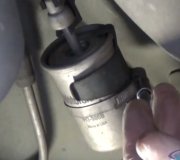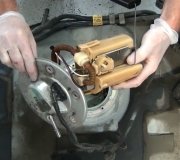Lately when I try and start it in the morning it fires but then coughs and splutters and then shuts off again. Each time you try to re start it thereafter it stays on a little longer each time ( a few seconds or so ) then coughs and splutters until it shuts off and then after quite a few attempts it seems to fire as normal and then everything’s fine. Once it fires as normal it runs without incident for the rest of the day and starts fine everytime however if you leave it un started for more than 8 hours ( usually overnight ) it has the issue starting again. It has a battery only 2 months old as I replaced that but didn't fix the issue. It seems to be taking longer and longer each morning and draining the battery now trying to get it going in the morning? Any ideas? I think that it being un started for more than 8 hours in the biggest clue?
Wednesday, December 9th, 2015 AT 5:56 PM


